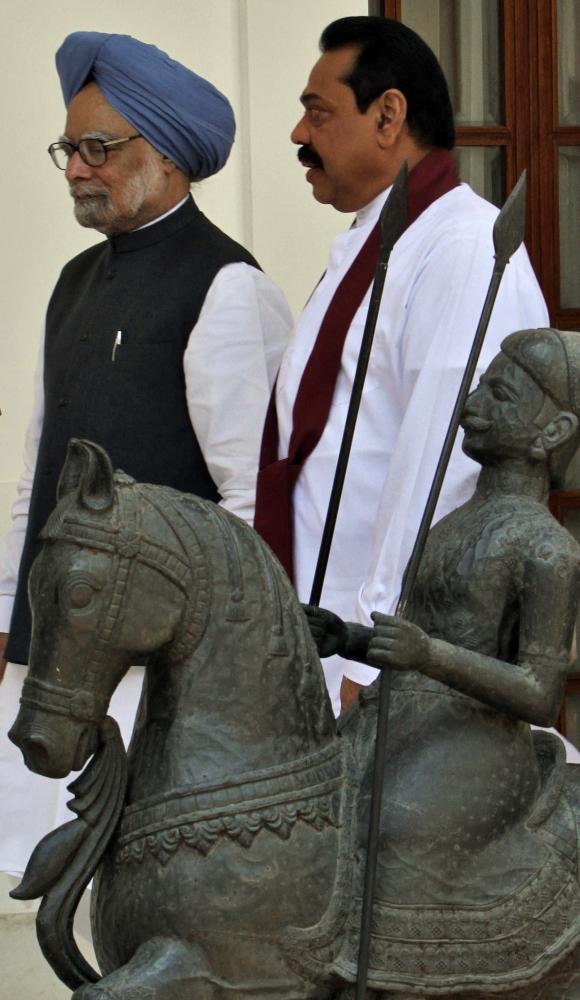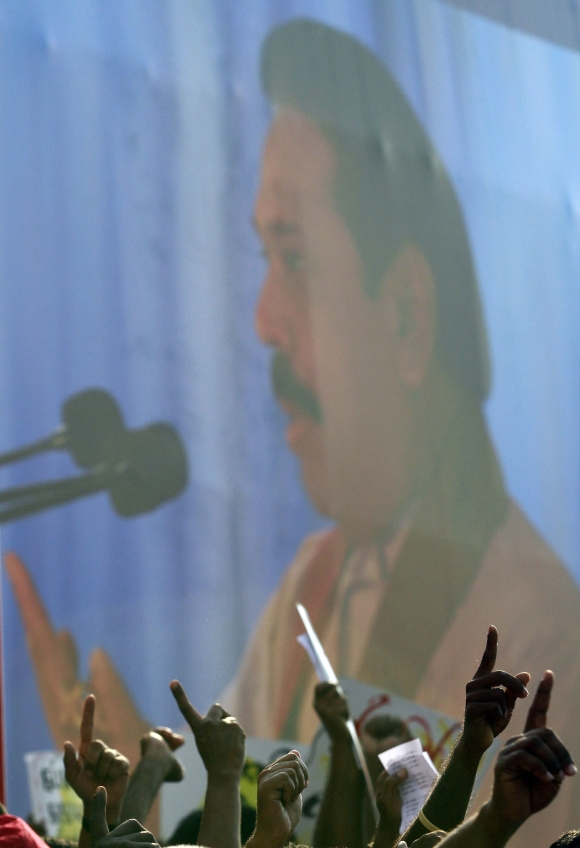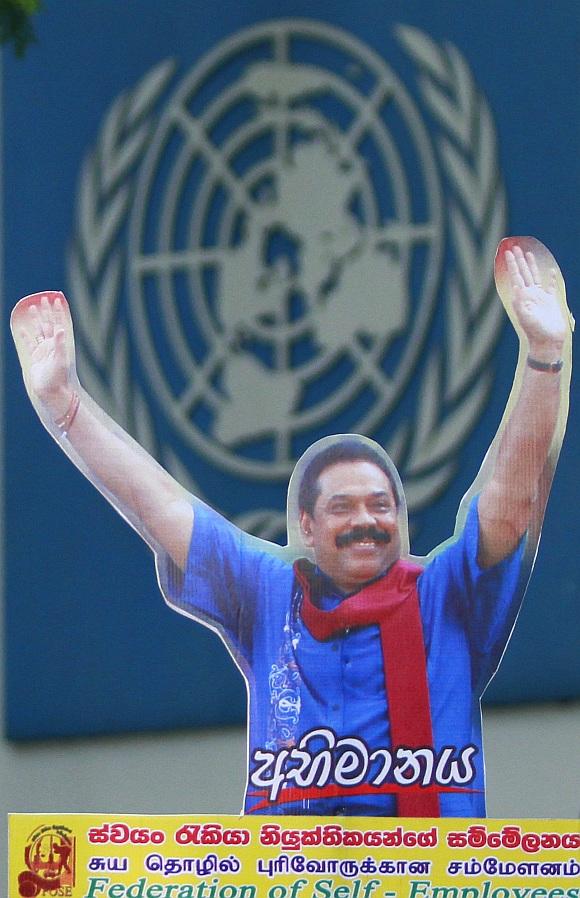 | « Back to article | Print this article |
DMK has NOTHING to do with India's vote against SL
Three years ago, Delhi had backed Colombo against the United States. What has changed now? Jyoti Malhotra finds out
India will vote at the United Nations Human Rights Council in Geneva today, March 23, against Sri Lanka and alongside the United States, in what amounts to an unprecedented critique against a fellow South Asian nation with which it has a long, intimate history spanning several millennia.
But to really understand why India is now willing to publicly chastise Sri Lanka in a multi-lateral forum, one has to return to the last days of the Sri Lankan army's civil war against the Liberation of Tamil Tigers Eelam in April-May 2009.
In recent weeks, the British media has led the charge against Colombo for wilfully participating in severe human rights violations against Tamil civilians caught in the crossfire at the time.
Significantly, this is a charge that India never substantiated, implicitly supporting Sri Lankan President Mahinda Rajapaksa's stand that the demonic LTTE terrorists needed to be decimated. Privately, there was much distress in Delhi over the killing of innocent Tamils but officials insisted, with a shrug, that "collateral damage" was, unfortunately, part of any war.
Click on NEXT for more...
DMK has NOTHING to do with India's vote against SL
So what describes this dramatic turnaround in India's posture? Here is a story confirmed by sources both in Delhi and in Colombo and that must finally be told.
It seems that in the dying days of the civil war, which ended with the killing of LTTE chief Prabhakaran, some western countries led by the US, sent word to Colombo that the Sri Lankan Army should allow Prabhakaran to "escape".
In fact, an escape vessel was said to be waiting on Sri Lanka's northern shores, around Jaffna, waiting to take Prabhakaran and his family on board.
In Colombo, the fury and chaos had to be seen to be believed, said the sources with knowledge of the event. Just then, New Delhi quietly moved its own warship, still in its own waters but close enough to the Sri Lankan frontline, sending out the unmistakable signal that it was fully behind Rajapaksa's determination to finish the LTTE.
India's argument, of course, was a simple one: Prabhakaran had masterminded the assassination of former Prime Minister Rajiv Gandhi and could not be allowed to escape.
Click on NEXT for more...
DMK has NOTHING to do with India's vote against SL
Over the decades in Sri Lanka, the LTTE had killed scores of moderate Tamil politicians, those who had dared to disagree. Now Prabhakaran had to suffer the consequences.
India's dramatic behind-the-scenes intervention in 2009 in Sri Lanka meant that it had stared down the mighty US, even though it had been forced to hold its own nose from the stench that emanated from the Tamil killings.
In fact, the trio that ran India's Sri Lanka policy at the time -- then National Security Advisor and now Governor of West Bengal M K Narayanan, then Foreign Secretary and now National Security Advisor Shiv Shanker Menon, as well as then Defence Secretary (now retired) Vijay Singh -- kept in close touch with Rajapaksa and his all-powerful brothers, Basil and Gotabhaya Rajapaksa. Today, too, one is the Cabinet minister for economic development and the other the defence secretary in Sri Lanka.
Clearly, Delhi had helped stiffen Rajapaksa's spine in 2009 against the interference of the so-called Western bloc because it was also protecting its own, amorphous sphere of influence in the region.
Click on NEXT for more...
DMK has NOTHING to do with India's vote against SL
In exchange, Rajapaksa committed to India that he would transform Sri Lanka's unitary form of government and devolve real power to the northern and eastern provinces, where Tamils are in a majority.
His predecessor, J R Jayewardene, had made a similar vow to Rajiv Gandhi in 1987, the so-called 13th Amendment. Rajapaksa, in fact, was said to have promised not only to pass the 13th Amendment but also pursue the "13th Amendment-plus" approach.
Three years have gone by, and despite Delhi's entreaties, Rajapaksa hardly seems closer to keeping his word. A Lessons Learnt and Reconciliation Commission offered a way forward, but Rajapaksa's reaction was to create a parliamentary select committee to discuss its recommendations, not announce a plan for peace.
If the Sri Lankan president believes today that Delhi's vote against Colombo in Geneva is being forced on Manmohan Singh's Congress party by alliance partners like the Dravida Munnettra Kazhagam (who need to assuage its Tamil voter base in Tamil Nadu), it will be making a big mistake.
Click on NEXT for more...
DMK has NOTHING to do with India's vote against SL
There is genuine distress in Delhi about Rajapaksa refusing to learn the only real lesson from the civil war and his victory in the elections that followed: the Tamils are also his people and he must reach out to them to understand their deep insecurities about being second-class citizens in their own country.
If Rajapaksa can come up with a time-bound plan to devolve real power, including to the police, in the north and the east, he will go down in history as the first Sri Lankan leader that contained both Sinhala and Tamil nationalism.
In fact, Delhi will be the first to shower Sri Lanka with aid and grants and anything else it wants, just like the two patrol vessels it sold Colombo in February.
However, if Rajapaksa pleads for time and invokes the right-wing Sinhala view that brands the entire Tamil community in various shades of the LTTE, his stupendous victory over the Tigers in 2009 will soon become a hollow one.
As for the short-term gain of playing the Chinese off against India, that's not going to work either. India is far too big and far too close. Even the Americans, their influence already in relative decline, are beginning to understand Delhi's exercise of benign power.
Click on NEXT for more...






